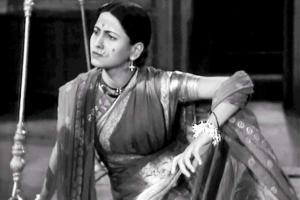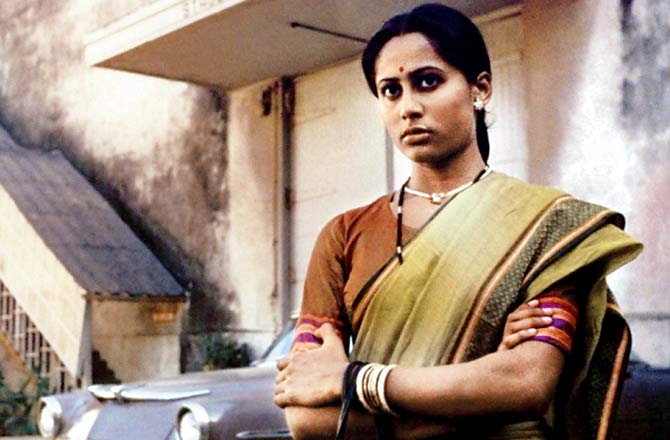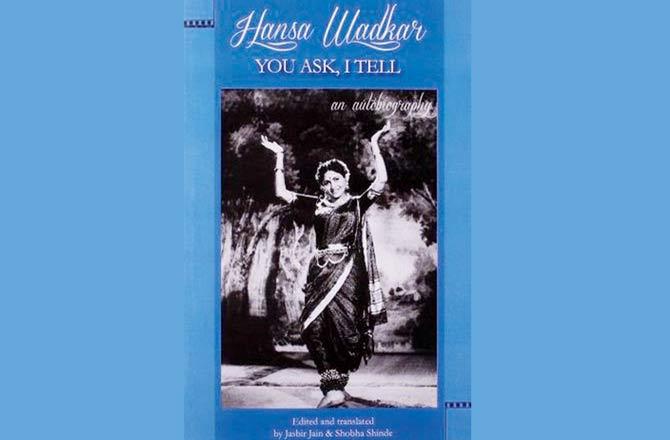Reading actor Hansa Wadkar's memoir amid the sexual harassment storm reminds you of a gutsy woman who resented the male-controlled film industry way back in the 1930s

Actor Hansa Wadkar essayed lead roles in Marathi and Hindi films in the 1930s and '40s
 To dress up like a man in a kurta-pyjama-coat and go pillion riding in the night — this was one of the favourite pastimes of actor Hansa Wadkar (1923-71), when she essayed lead roles in Marathi and Hindi films in the '30s and '40s of the last century. In her memoir, Sangtye Aika (I Tell, You Listen), published in 1970, she recalls her strong urge to "hire cabs in the night and dine out at unearthly hours in Pune, just to prove that we could do anything beyond the set timings." Once, when she was seated behind senior thespian Raja Paranjpe — her director in the film Pudhcha Paul, which translates to The Forward Step — she insisted that he zoom past the desolate Aundh locality. Paranjpe, who was riding at breakneck pace, lost control midway and fell off his bike; he was hurt badly. Wadkar was not seriously injured, but she lost Paranjpe's friendship after the accident.
To dress up like a man in a kurta-pyjama-coat and go pillion riding in the night — this was one of the favourite pastimes of actor Hansa Wadkar (1923-71), when she essayed lead roles in Marathi and Hindi films in the '30s and '40s of the last century. In her memoir, Sangtye Aika (I Tell, You Listen), published in 1970, she recalls her strong urge to "hire cabs in the night and dine out at unearthly hours in Pune, just to prove that we could do anything beyond the set timings." Once, when she was seated behind senior thespian Raja Paranjpe — her director in the film Pudhcha Paul, which translates to The Forward Step — she insisted that he zoom past the desolate Aundh locality. Paranjpe, who was riding at breakneck pace, lost control midway and fell off his bike; he was hurt badly. Wadkar was not seriously injured, but she lost Paranjpe's friendship after the accident.
ADVERTISEMENT
Amusingly, this was around the period (1949) when she was playing the part of revered saint poetess Janabai, under the Prabhat Film Company's prestigious banner. I laughed at the irony of the situation, which is beautifully etched in Sangtye Aika — my reading preference for the Dussehra holiday. The holiday ended with revisiting the Shyam Benegal-directed Hindi film Bhumika (1977), which is inspired by Wadkar's journey. For over two weeks, I was absorbing voices of women from the Indian film industry, mostly performers who recalled their histories of sexual and workplace harassment. At the root of these stories were unfair gender equations. The personal had turned political, and one Bollywood actor formed the nucleus of the conversation. That triggered my urge to visit a piece of writing, which spoke of the industry's male entitlement way back in the '30s and '40s. Wadkar's decision to make things public was unusually brave and asymptomatic of her times. Hers was not a sob story, but a coming to terms with a world (and an industry) that was governed by men.

Smita Patil-starrer 1977 film Bhumika is inspired by Hansa Wadkar's life
I was particularly touched by one instance, which sort of encapsulates the level of gender sensitivity prevailing on film sets of those times. During the shooting of Ram Joshi, Wadkar wanted to be excused from the neck-deep water scene. Taking director Baburao Painter aside, she asked for a postponement, quietly hinting at her ongoing periods. Painter agreed, but soon forgot the conversation. As he signalled her to take the jump with her co-star, she couldn't muster the courage to remind him of her inconvenience in everyone's presence. It is unfortunate that Sangtye Aika is a thin book. It could have expanded much beyond 67 pages (Rajhans Prakashan, R65, fifteenth edition in 2015), considering the zapping fast-paced transformative developments in Wadkar's life. Publisher SG Majgaonkar's note acknowledges the
Whether it was gender equations of her time, workspace-related issues and payment structures, Hansa Wadkar had a lot to offer than what she managed to articulate in a long article in the Manoos Diwali magazine in 1966. She had, in fact, decided to expand on the content, by agreeing to give extensive interviews for fleshing out a full-fledged autobiography. But shortly after the first few meetings, she fell ill. One is not sure how much she was pursued by the Rajhans editorial team in the years before her death. The republished magazine piece is in that sense incomplete. Her descriptions of Prabhat company's work culture; her take on various male directors including V Shantaram; her identification with contemporary actors (Lalita Pawar, Leela Chitnis, Devika Rani, Sulochana) could have been more vivid. One can understand the sketchy one-line mention of her unreported rape by a magistrate. But the debutante writer deals with many other life-changing incidents in minor breezy anecdotes.

Wadkar's memoir, Sangtye Aika, is a wafer-thin book, originally published in 1970
Just as deft editing could have done justice to the account, a more nuanced screenplay would have helped present Wadkar's story better on celluloid. Bhumika works as a standalone film, but it doesn't catch the chemistry of Sangtye Aika. The late Smita Patil, who played Hansa Wadkar, doesn't match up to the colourful woman you encounter in the book. Patil's Usha is a perplexed soul, a 24/7 intense harried beauty, always at the receiving end, and never the ferocious survivor. But the book presents a troubled-yet-naughty protagonist whose life unfolds in distinct stages — a 10-year-old confused child who was dragged into singing and acting as she first faced the camera; a 16-year-old pregnant frolicking adolescent who suffers a miscarriage on the sets of the film Durga; a resource-crunched struggler who once tries her luck with racing horses to earn money on the side; a spunky single woman who stays alone for a year in Mumbai's Bell Hotel; a tired spouse who finds solace in a stranger's household in far-off Marathwada; a tireless worker who acted in 60-odd Marathi-Hindi movies and theatre; the experimenter who mounted an unsuccessful start-up film company (Kalpana Chitra) with her squabbling husband.
Wadkar's memoir underscores known factors defining women's status in the film industry, some of which have unfortunately remained constant. Her story revolves around the minuses she inherits, the backdrop she is born with. She is tied to impoverished parents belonging to the kalavantin (courtesan) family clan. She opts out of formal schooling to facilitate her brother's future. Her entry into the film world coincides with her ill-fated marriage with an insecure and relatively-older man, who controls her finances and career choices. At critical junctures when she wants to retire, she is pushed into film projects, merely due to family needs. As an aged actor, she loses her market value and is denied meaty roles. She gradually loses her ability to dance on stage, which further pushes her into oblivion. But what is noteworthy is the absence of bitterness while she recaps her career compromises; she admits the awkward situations she couldn't avoid in her pursuit of the limelight. One has deep respect for a supremely candid performer, who accepts her lifelong craving for film world glamour.
Sangtye Aika is about Wadkar's ability to embrace life despite mounting odds. One can identify with her carefree teenage years, as she manages to chuckle amid penury and resultant chaos. When the film shooting of Airmail takes her to Karachi, both the parents are unwell and dependent. Taking her brother along as an escort, she makes the most of the first outdoor shoot experience; she learns driving while in Karachi. In her initial years, many of her films don't release. But she is not desperately seeking visibility; the monthly salary is enough to keep her happy. While with Prabhat company, she insists on trying out bhang just to ape some seniors on the sets. She takes to hard liquor later as a means to forget her messy marriage. She is aware of the health consequences of her rash actions. But how could she lose out on the limited avenues of crackling laughter? The memoir ends on a meditative note, neither justifying nor glorifying an unusual life. The last shot of the film Bhumika depicts a listless and lost actor. Wadkar was anything, but disinterested and lost; she was weak with age, but always living up to her guiding sentiment, I Tell, You Listen.
Sumedha Raikar is a culture columnist in search of the sub-text. You can reach her at sumedha.raikar@gmail.com
Catch up on all the latest Crime, National, International and Hatke news here. Also download the new mid-day Android and iOS apps to get latest updates
 Subscribe today by clicking the link and stay updated with the latest news!" Click here!
Subscribe today by clicking the link and stay updated with the latest news!" Click here!






